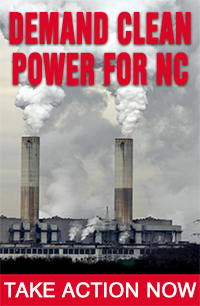Front Porch Blog
Editors’ Note: This is the first of three posts in a series that we’ll share this week about North Carolina and the Clean Power Plan. Friday is the final day for North Carolinians to demand the N.C. Department of Environmental Quality abandon its efforts to block the Clean Power Plan. Add your voice here | Read part 2.
North Carolina’s elected leaders and agency officials, with little say from the citizens they represent, have placed us on a reckless course in regard to our future energy mix and our ability as a state to determine that future.
But together we can change that.
Appalachian Voices, as part of a wide network of organizations and citizens from across the state, is working hard to convince North Carolina’s decision makers to change course and chart a path that meets or exceeds the federal government’s requirements for our state under the Clean Power Plan.
Back in October, the U.S. Environmental Protection Agency published the final rule for the Clean Power Plan — a new regulation that requires states to achieve specific targets for reducing carbon emissions from electric generating power plants by 2030. States may choose either to improve the average emissions per-unit of electricity generated, a “rate-based” approach, or to develop a plan for reducing overall emissions, a “mass-based” approach.
The Clean Power Plan provides states with flexibility in determining how they will achieve their specific targets, and even incentivizes the early development of programs that will result in renewable energy generation or energy efficiency gains for low-income communities. For North Carolina, the rate-based approach would require a 32 percent improvement in emissions rate by 2030 for an overall 12.5 percent reduction in annual carbon emissions.
While many states are legally challenging the EPA’s authority to enact the Clean Power Plan, most of those states are still moving ahead and developing plans that meet EPA’s requirements. North Carolina, on the other hand, has wasted taxpayer dollars by developing a plan that the government admits is designed to fail.
The N.C. Department of Environmental Quality’s “plan to fail” focuses only on four coal-fired power plants while requiring nothing of the state’s natural gas plants. The “plan to fail” also fails to even mention renewable energy or energy efficiency. Despite the EPA’s requirements, the “plan” was developed without any stakeholder input; the state only involved stakeholders during a series of three public hearings that came after the plan had already been developed.
DEQ Secretary Donald van der Vaart falsely justifies the agency’s plan by stating that the EPA does not have the legal authority to require anything other than what the state plan addresses, which is emissions reductions for coal-fired power plants. This is problematic because if the state ends up being wrong, as numerous legal analyses show it is, then the EPA will impose its federal plan on North Carolina.
Given the current attitude of our state’s leaders toward clean energy and environmental protection, this may prove to be a blessing. It would be a far more preferable approach, however, if state officials were to develop a plan that reflects the desires of North Carolinians, and that builds upon the substantial growth in the clean energy economy that the state has experienced over the past seven years.
For now, the state’s “plan” achieves less than 3 percent of the total reduction in annual carbon emissions required by EPA and does nothing to advance the state’s clean energy economy. It also leaves the citizens and businesses of our great state vulnerable to the inevitable increase in energy costs resulting from a continued reliance on fossil fuels and a federally imposed compliance plan.
North Carolina can do better. It should do better. And millions of North Carolina residents need their leaders to lead and chart a path toward a clean energy future, instead of setting us on a crash course that will have severe economic and environmental consequences.
A state compliance plan that focuses more on renewable energy and energy efficiency can create tens of thousands of jobs and help alleviate poverty while improving air and water quality for us all. Failing short of that will halt seven years of progress in clean energy development, leave us vulnerable to future contamination of our air and waterways from fossil fuel generation and coal ash disposal, and likely result in higher energy bills that negatively affect everyone — especially those already struggling to afford their energy bills.
Appalachian Voices is calling on North Carolinians to let the DEQ know that we won’t stand for its recklessness. Take a moment to comment on the state’s “plan to fail” and let the administration know that we need a clean energy future. The deadline to comment is this Friday, Jan. 15.
Stay informed by subscribing to the Front Porch Blog.
PREVIOUS
NEXT
Related News

Leave a comment
Your email address will not be published. Required fields are marked *
2 responses to “North Carolina’s reckless approach to the Clean Power Plan: Part 1”
-
Thanks for providing education, DATA, and a way to get involved and be heard!
-
We can do better than 3% Plan for a clean energy future!



Leave a Comment